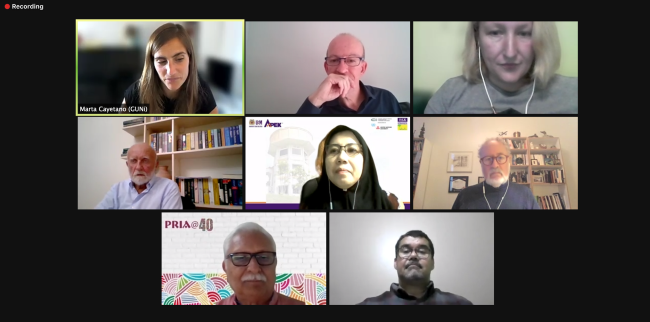Date/Time
Date(s) - 06/10/2021
7:30 pm
Categories No Categories

The GUNi book launch was hosted in collaboration with our UNESCO Chair. Dr. Budd Hall set the stage for the dialogue by stating that the mandate of our UNESCO Chair is to build research capacities in the field of community based participatory research in the Global South and Excluded North and build locally led scholarship on pressing societal issues. The current initiatives of the K4C Global Consortium include SSHRC- Bridging Knowledge Cultures to explore how higher education institutions play a vital role in creating a newly imagined world, in recognising diverse epistemologies. The Chair also works towards supporting integration of teaching, research and service. It is time to move beyond the myth of universal higher education to a pluriversal higher education.
Olha Mykhailyshyn stated that it is not enough for students to use their brains, they must have love and sensitivity in their hearts in the context of persons with intellectual disabilities. With keeping issues of mental disability closely involved with their higher education institutions, students learn to focus on “to be with” instead of “to be for”. Persons with intellectual disabilities give us a choice to love or to be loved.
Bohdan Krawchenko stated that their university has a core inter-disciplinary curriculum for students. Moreover instead of narrow majors, they have integrated majors coupled with stress on community engagement to create compassion among graduates.
Darren Lortan stated that the difference between those who grow into the elite and those who join the egalitarian is linked to the distinction students make between privilege & vocation of education.
Asyirah Abdul Rahman stated that both internal engagement within the class and external engagement with the community help students reflect better on the concepts learnt in the classroom. They also help them with their own individual reflections in terms of their values and cultures.
Dr. Budd Hall added that while working with persons with disabilities, we ignore them as knowledge creators and ignoring their knowledge is a great loss for us in making efforts for a better world. He added that most knowledge in the world is shared in ways beyond academic knowledge sharing, and if we are concerned with the use of knowledge as a transformative instrument, we need to think of knowledge in many different ways.
Dr Tandon gave closing remarks, reminding participants that the mind doesn’t work without the heart. Integrating body, mind and spirit is critical now more than ever. Affection, love, intimacy are not only the source of survival but also the source of knowledge.
See program flyer here.




